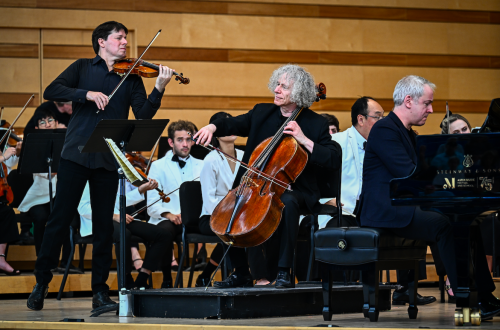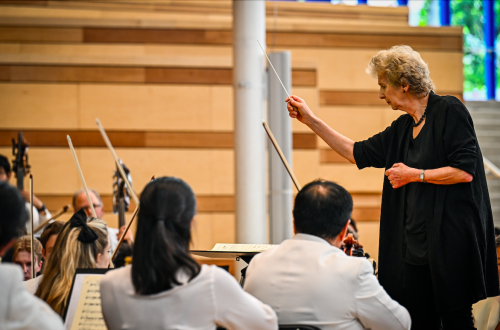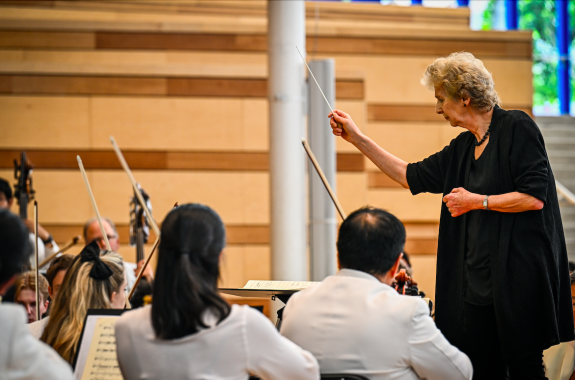
 United States Aspen Music Festival 2024 [4]: Aspen, Colorado. (HS)
United States Aspen Music Festival 2024 [4]: Aspen, Colorado. (HS)

Violinist Joshua Bell, cellist Stephen Isserlis and pianist Jeremy Denk, marquee soloists all, travel the world from time to time as the Bell-Isserlis-Denk trio. Their camaraderie and musical unanimity brought extra depth to an evening of Fauré chamber music in Harris Hall on Saturday, and to a thoroughly engaging Triple Concerto by Beethoven on Sunday with the Aspen Festival Orchestra in the music tent.
Saturday’s exploration was especially satisfying. At times the combined sound of Bell’s and Isserlis’s Stradivarius instruments, aided and abetted by Aspen regular David Halen’s violin, Zhenwei Shi’s viola and Denk’s piano, approached the richness of a full orchestra in Fauré’s ultra-Romantic harmonic and melodic style.
The Piano Trio in D minor, written shortly before Fauré’s death in 1924, is the most elegant piece of the three they played. Its brevity – twenty minutes as opposed to the half-hour playing times of the larger pieces – built upon simple melodies that wound tightly before expanding. Harmonies emerged from counterpoint. The Andantino took its time but did not lag, creating a dreamy world, and the robust final movement centered on rhythmic vitality from Denk.
The big Piano Quintet No.1, also in D minor, started with deftly intertwining melodic phrases against ripples in the piano. By the second movement, the Adagio, the mood turned almost meditative. The boldly rhythmic finale, spearheaded by crisp playing from Denk, reached a rousing conclusion.
In the Piano Quartet No.2 in G minor, which occupied the second half of the program, an extended unison statement felt like it came from a single instrument, followed by a spicy argument among different combinations of instruments. The back-and-forth and twixt-and-tween was at times mesmerizing, until it came to a satisfying bump at the finish.
The persistently loud second movement, with its merry syncopation, led to a serene and gently executed combination of chords and bell-like sounds from the piano. The finale, marked Allegro molto but taken at a faster clip, had Denk racing to keep up. He executed all the notes (even if I lost some of the rhythmic emphasis) while the strings kept blazing away to a big finish.

On Sunday, the trio sailed through Beethoven’s three-way concerto as if rolling downhill on bicycles. Conductor Jane Glover had the orchestra bouncing along amiably and, as Beethoven intended by giving the cello all the difficult music, Isserlis was the star. He executed rapid embellishments exuberantly, and even played along with the orchestra’s statements of the themes. His soulful, long melodic line in the slow movement was gripping, but even better was when the three soloists tossed around the melody as if they were a single instrument with three voices.
They put on quite a show, Isserlis tossing his silver hair in rhythm, Bell gesturing full-body with the shape of the melodies, Denk casting quick glances at all parties. More importantly, the music emerged with all appropriate verve.
The program opened with an unexpected choice for Glover, who is not known for mid-twentieth-century but more for Baroque and Classical (although she has recorded symphonic music by Britten). With some of the clearest conducting anyone could want, she brought precision and concentration to Bartók’s Concerto for Orchestra, drawing a nearly note-perfect performance.
If anything, these tight reins kept the piece from being quite as free-wheeling as it often is, but it was satisfying to hear what a conductor can do with music that an audience might not associate with her, even in one of this composer’s least spiky scores. Deliberate tempos at first contrasted with build-ups to faster music later, and dynamic balances let all the layers of sound come through.
Friday’s Chamber Symphony concerto conversed in Spanish, an unusual mix for the festival’s programming, and perhaps it accounted for a sparse turnout for what turned out to be comfortable performances of music by Gabriel Lena Frank (reflecting her Peruvian heritage), a setting of five sonnets by the Chilean poet Pablo Neruda and two popular Spanish-bathed works by composer Manuel de Falla. Music director Robert Spano conducted.
Frank’s music does not rely on bristly dissonance, and Haillí–Serenata opened the concert by conjuring up the mountain atmosphere of Peru nicely. Audiences know Falla’s El amor brujo, and pianist Joyce Yang, who played the solos in his Nights in the Garden of Spain, is a long-standing favorite here. Spano, unfortunately, allowed the orchestra to drown out too much of the piano in Nights in the Gardens of Spain, which also could have emitted more Iberian fragrance.
Mezzo-soprano Kelley O’Connor has made the Neruda Songs a specialty, and she can convey Peter Lieberson’s poignant music’s twists and turns, even if there was a certain sameness in the orchestra’s interpretation. She sang the four songs scattered through the ballet music of El amor brujo with similar understanding. Spano and the orchestra gave it a solid reading.
Harvey Steiman
12.7.2024, Frank, Lieberson, Falla: Kelly O’Connor (mezzo-soprano), Joyce Yang (piano), Aspen Chamber Symphony / Robert Spano (conductor). Klein Music Tent
Gabriela Lena Frank – Haillí–Serenata
Lieberson – Neruda Songs
Falla – Nights in the Gardens of Spain, El amor brujo
13.7.2024, A Fauré Evening with Joshua Bell (violin), Stephen Isserlis (cello), Jeremy Denk (piano): David Halen (violin), Zhenwei Shi (viola). Harris Hall
Fauré – Piano Trio in D minor, Op.120; Piano Quintet No.1 in D minor, Op.89; Piano Quartet No.2 in G minor, Op.45
14.7.2024, Bartók, Beethoven: Joshua Bell (violin), Stephen Isserlis (cello), Jeremy Denk (piano), Aspen Festival Orchestra / Jane Glover (conductor). Klein Music Tent
Bartók – Concerto for Orchestra
Beethoven – Concerto in C major for Violin, Cello and Piano, ‘Triple’
